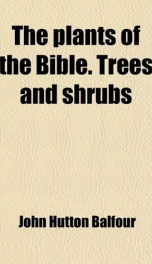the plants of the bible

Purchase of this book includes free trial access to www.million-books.com where you can read more than a million books for free. This is an OCR edition with typos. Excerpt from book: BOX-TREE. (Buxus sempervirens.) " I will set in the desert the fir-tree, and the pine, and the box together." Isaiah xli. 19. THE box-tree is the Bwxus sempervirens of botanists. It is mentioned in the Bible under the Hebrew name of Teashur. The tree belongs to the class Monoecia, order Tetrandria, of the Linnean system, and to the natural order Euphorbiacese, or the Spurgewort family. The plants of this order have peculiar involucrate flowers, often without any perianth, and their fruit is usually composed of three carpels, which separate in an elastic manner when ripe. They abound in milky juice, which has in general acrid and poisonous qualities. Starch as well as oils and caoutchouc are procured from many of the species. The box is a native of most parts of Europe, and grows well in England, as at Boxhill, in Surrey. It is prized as an ornamental evergreen; and in a dwarf state is used for garden borders. Its wood, imported from the Levant, is used by the wood-engraver, the turner, the mathematical instrument maker, the comb and toy maker, and others. The wood is hard and durable, and was formerly used for tablets which were covered with wax and used for writing. The practice of inlaying the box-wood with ivory is noticed by ancient authors. Thus Virgil says: Aut collo decus, ant capiti; vel qnale per artem Inclusum buxo, aut Oricia terebintho, Lucet ebnr. JEneid x. 135. The prophet Isaiah refers to the box as one of the trees fitted to beautify the wilderness and the desert: " I will plant in the wilderness the cedar, the shittah-tree [Acacia SeyaT, the myrtle, and theoil-tree [olive-tree]; I will set in the desert the fir-tree, the pine, and the box-tree together " (xli. 19). Again, in referring to the glory of the latter days, lie speaks of the box...
Info about the book
Author:
Series:
Unknown
ASIN:
078529807X
Rating:
5/5 (4)Your rating:
0/5
Languge:
English
Users who have this book
Users who want this book
What readers are saying
What do you think? Write your own comment on this book!
write a commentif you like the plants of the bible try:
Do you want to read a book that interests you? It’s EASY!
Create an account and send a request for reading to other users on the Webpage of the book!


